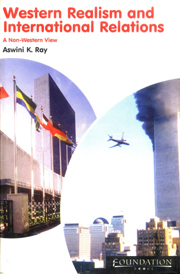Book contents
- Frontmatter
- Contents
- Preface
- 1 National Security and the International System
- 2 Emergence of the Post-War Global System of Security
- 3 Myths and Reality of Realism
- 4 Western Realism in South Asia
- 5 Hegemony of Realism
- 6 Gobalisation and the Crisis of Realism
- 7 Justice as Realism in International Relation
- Bibliography
- Index
2 - Emergence of the Post-War Global System of Security
Published online by Cambridge University Press: 26 October 2011
- Frontmatter
- Contents
- Preface
- 1 National Security and the International System
- 2 Emergence of the Post-War Global System of Security
- 3 Myths and Reality of Realism
- 4 Western Realism in South Asia
- 5 Hegemony of Realism
- 6 Gobalisation and the Crisis of Realism
- 7 Justice as Realism in International Relation
- Bibliography
- Index
Summary
Origin of the Collective Security System
During the critical early phase of the war in Europe, while the German Panzers were advancing steadily across western Europe, Prime Minister Churchill in his Atlantic meeting with President Roosevelt in 1941, suggested the desirability of a declaration on the formation of an international organization for security after the war. President Roosevelt was initially reluctant, wiser from the experience of President Wilson and the League of Nations after the earlier World War; he was skeptical of its endorsement by the Congress.
But such a declaration had the political attraction of motivating many of the states still outside the actual theatre of aggression by the Axis Powers, particularly many of the Asian and African colonies in the midst of their liberation struggle, to associate themselves with the war efforts of the Allied Powers. Some Axis Powers were also targeting their propaganda offensive directed at Asian nationalism. The Japanese Imperial Army, for example, was propagating the idea of an ‘Asian Co-prosperity Sphere’. President Roosevelt could not totally brush away the suggestion, less so since it was from the British Prime Minister, and no less a war hero than Winston Churchill.
The final Declaration of the Atlantic Charter envisaged ‘a peace affording all peoples security against aggression, freedom to choose their own governments, access on equal terms to the trade and to the raw materials of the world, improved labour standards, economic adjustments and social security, freedom from fear and want, freedom of seas’; and, it urged ‘all nations must come to the abandonment of force’.
- Type
- Chapter
- Information
- Western Realism and International RelationsA Non-Western View, pp. 7 - 49Publisher: Foundation BooksPrint publication year: 2004

